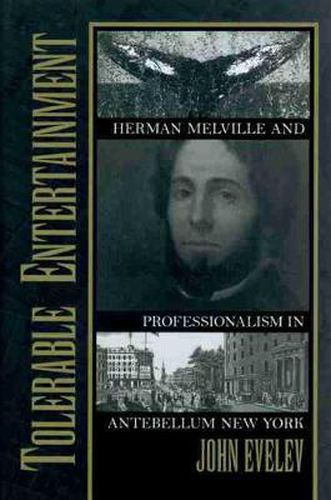Readings Newsletter
Become a Readings Member to make your shopping experience even easier.
Sign in or sign up for free!
You’re not far away from qualifying for FREE standard shipping within Australia
You’ve qualified for FREE standard shipping within Australia
The cart is loading…






A fresh look at the social context of a great American writer In Tolerable Entertainment, Herman Melville’s life and literary work serve as windows on the tumultuous world of antebellum New York City. Charting Melville’s writings from Typee (1846) to Pierre (1852) as responses to his experience of living in the city, this book reveals the dramatic shifts in American life occurring at the time. Perhaps more than any other nineteenth-century writer, Melville has been read and understood in the context of his career, embodied in a narrative of the trajectory from immature emergence, through brilliant ascendance, to collapse into neglect. Moving beyond these stereotypes, John Evelev uses Melville’s writings to place the concept of
career
within a historical framework, as part of the ideological project of a new middle-class professionalism. He describes a meritocratic ethos of competitive specialization and expertise that distanced itself from both the deskilling of industrialized labor and the older professional arrangement of elite patronage. By exploring the intersections of class and culture in antebellum America, Evelev offers a new perspective on Melville’s literary career. Tolerable Entertainment reads Melville’s life and work in relation to such cultural developments as the famous
high/low
theater riots at Astor Place and the rise of the lyceum circuit, a forum for celebrity lecturers to reach the new urban
middle-brow
audience. The book also considers such transformations in antebellum social attitudes as urban workers’ protests against industrialization and the growth of the
self-culture
of the new urban middle class, with the emergence of vocational associations and professional specialization. Evelev’s readings run against the grain of modern Melville scholarship by emphasizing not the values of individualism and democracy that have led critics to construe Melville’s writings as central to the American canon, but rather the ambivalent cultural and vocational distinctions of the developing middle class to which Melville belonged.
$9.00 standard shipping within Australia
FREE standard shipping within Australia for orders over $100.00
Express & International shipping calculated at checkout
A fresh look at the social context of a great American writer In Tolerable Entertainment, Herman Melville’s life and literary work serve as windows on the tumultuous world of antebellum New York City. Charting Melville’s writings from Typee (1846) to Pierre (1852) as responses to his experience of living in the city, this book reveals the dramatic shifts in American life occurring at the time. Perhaps more than any other nineteenth-century writer, Melville has been read and understood in the context of his career, embodied in a narrative of the trajectory from immature emergence, through brilliant ascendance, to collapse into neglect. Moving beyond these stereotypes, John Evelev uses Melville’s writings to place the concept of
career
within a historical framework, as part of the ideological project of a new middle-class professionalism. He describes a meritocratic ethos of competitive specialization and expertise that distanced itself from both the deskilling of industrialized labor and the older professional arrangement of elite patronage. By exploring the intersections of class and culture in antebellum America, Evelev offers a new perspective on Melville’s literary career. Tolerable Entertainment reads Melville’s life and work in relation to such cultural developments as the famous
high/low
theater riots at Astor Place and the rise of the lyceum circuit, a forum for celebrity lecturers to reach the new urban
middle-brow
audience. The book also considers such transformations in antebellum social attitudes as urban workers’ protests against industrialization and the growth of the
self-culture
of the new urban middle class, with the emergence of vocational associations and professional specialization. Evelev’s readings run against the grain of modern Melville scholarship by emphasizing not the values of individualism and democracy that have led critics to construe Melville’s writings as central to the American canon, but rather the ambivalent cultural and vocational distinctions of the developing middle class to which Melville belonged.